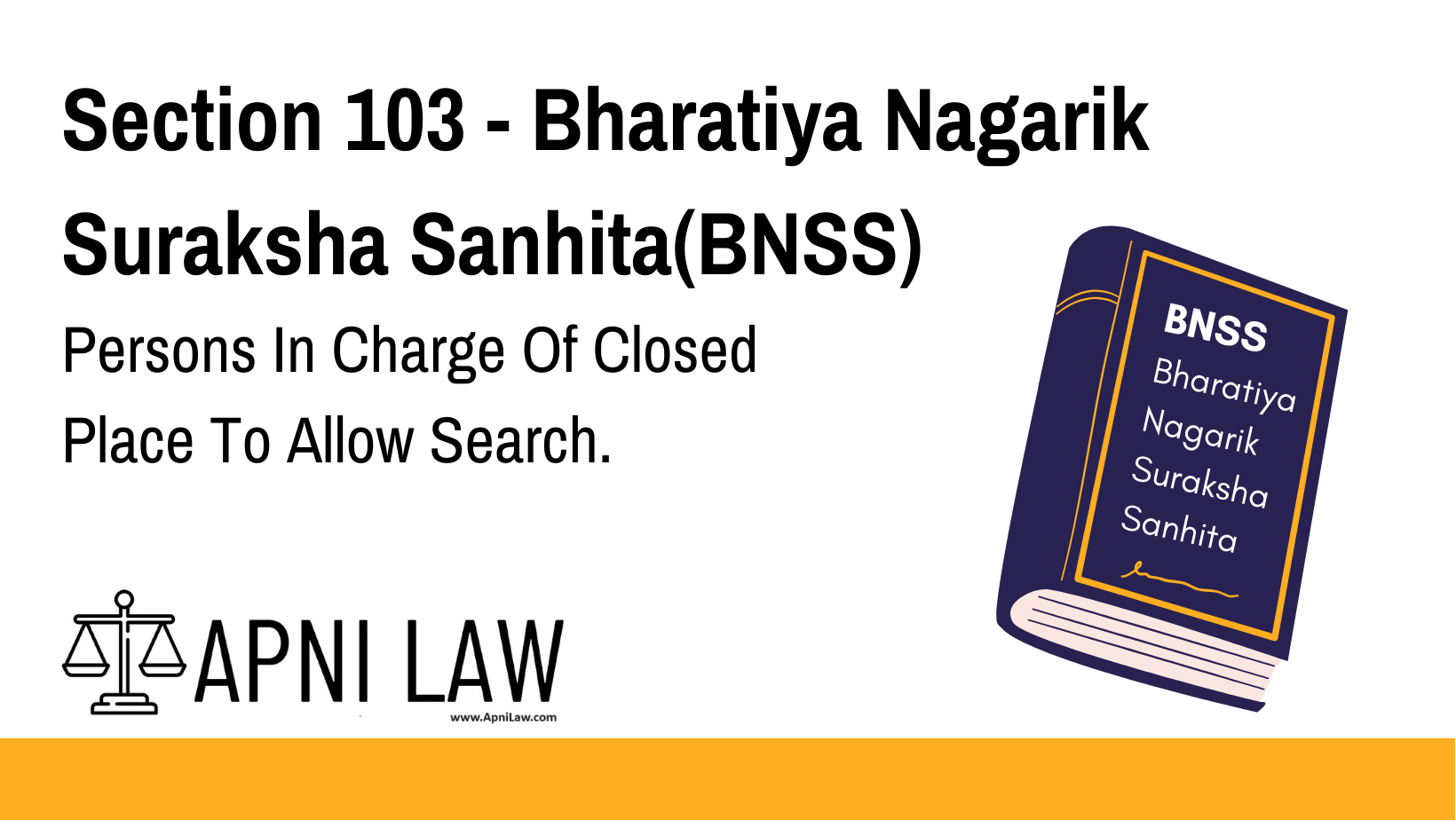Bharatiya Nagarik Suraksha Sanhita (BNSS) Section 103- Persons In Charge Of Closed Place To Allow Search
This section deals with the procedure for conducting searches and inspections under the BNSS. Here is a review on what persons in charge of closed place to allow search deals with:
1. Ingress to Closed Place:
– When any place that is liable to search or inspection under this Chapter is closed,
– The person residing in or in charge of the place must allow free ingress (entry) to the officer or other authorized person executing the warrant.
– Upon demand and production of the warrant, this search must be carried out.
2. Alternative Procedure if Ingress Denied:
– If entry into the place cannot be obtained as required,
– The officer or other person executing the warrant may proceed as provided in sub-section (2) of section 44.
3. Search of Persons Reasonably Suspected:
– If any person in or around the place is reasonably suspected of concealing any article.
Furthermore, when searching female individuals, female officers must prioritize decency and respect.
4. Presence of Witnesses:
– Before conducting the search, the officer or person about to make the search must:
Request two or more independent and respectable local residents to attend.
If entry cannot be obtained as required, appropriate measures will be taken.
Officers require witnesses to attend and observe the search, issuing written orders when necessary.
5. Conduct of Search:
Witnesses are present during search conducts.
They must prepare a list of all items taken during the search.
The witnesses must sign the list.
6. Rights of Occupant or Representative:
The search must allow the occupant or their representative to attend.
A copy of the list of seized items, signed by the witnesses, must be provided to the occupant or their representative.
7. Search of Persons and List of Seized Items:
– If a person is searched under sub-section (3),
– A list of all items taken possession of during the search must be prepared.
8. Offence for Refusal to Witness Search:
– Any person who, without reasonable cause, refuses or neglects to attend and witness a search when called upon by a written order,
– Commits an offence under section 222 of the Bharatiya Nyaya Sanhita, 2023.
Explanation:
Law enforcement officials conduct searches of places and inspections of persons by following these procedures when a warrant is issued. It emphasises the following:
- Access to the Place: The person executing the warrant must receive access to the place for the search. If access is denied, the officer may use the methods outlined in Section 44(2) of the BNSS.
- Personal Search: If there is reasonable suspicion that someone is hiding items related to the search, they may be searched. In the case of women, another woman must perform the search with due regard for decency.
- Witnessing the Search: Two independent and respectable inhabitants of the locality must witness the search. The officer prepares a list of seized items and the witnesses sign it. The occupant may stay present during the search.
- Copy of Search List: A copy of the list of seized items, signed by the witnesses, must be provided to the occupant of the place searched.
- Refusal to Witness: Anyone refusing to witness the search without reasonable cause will face legal action under Section 222 of the BNSS.
Illustration:
Authorities search a house for illegal drugs using a warrant. The officer arrives at the house and presents the warrant to the homeowner. The homeowner refuses to allow the officer access. Persuant to Section 103, the officer can then proceed as follows:
- Use the methods of Section 44(2) to gain access to the house.
- The officer will ask two independent witnesses to be present during the search.
- The witnesses will prepare and sign a list of any drugs found, and they will give a copy to the homeowner.
Common Questions and Answers:
Q: Can the officer break into the place without permission?
A: The methods outlined in the Section 44(2) be used when access is denied.
Q: Is it mandatory for the occupant to be present during the search?
A: The occupant or their representative may stay present during the search.
Q: What happens if the witnesses refuse to sign the list?
A: The officer should document the refusal and proceed with the search. The court may consider the refusal.
Q: What if the officer finds items not mentioned in the warrant?
A: The officer may seize these items if they have a reasonable belief that the items are related to the crime.









